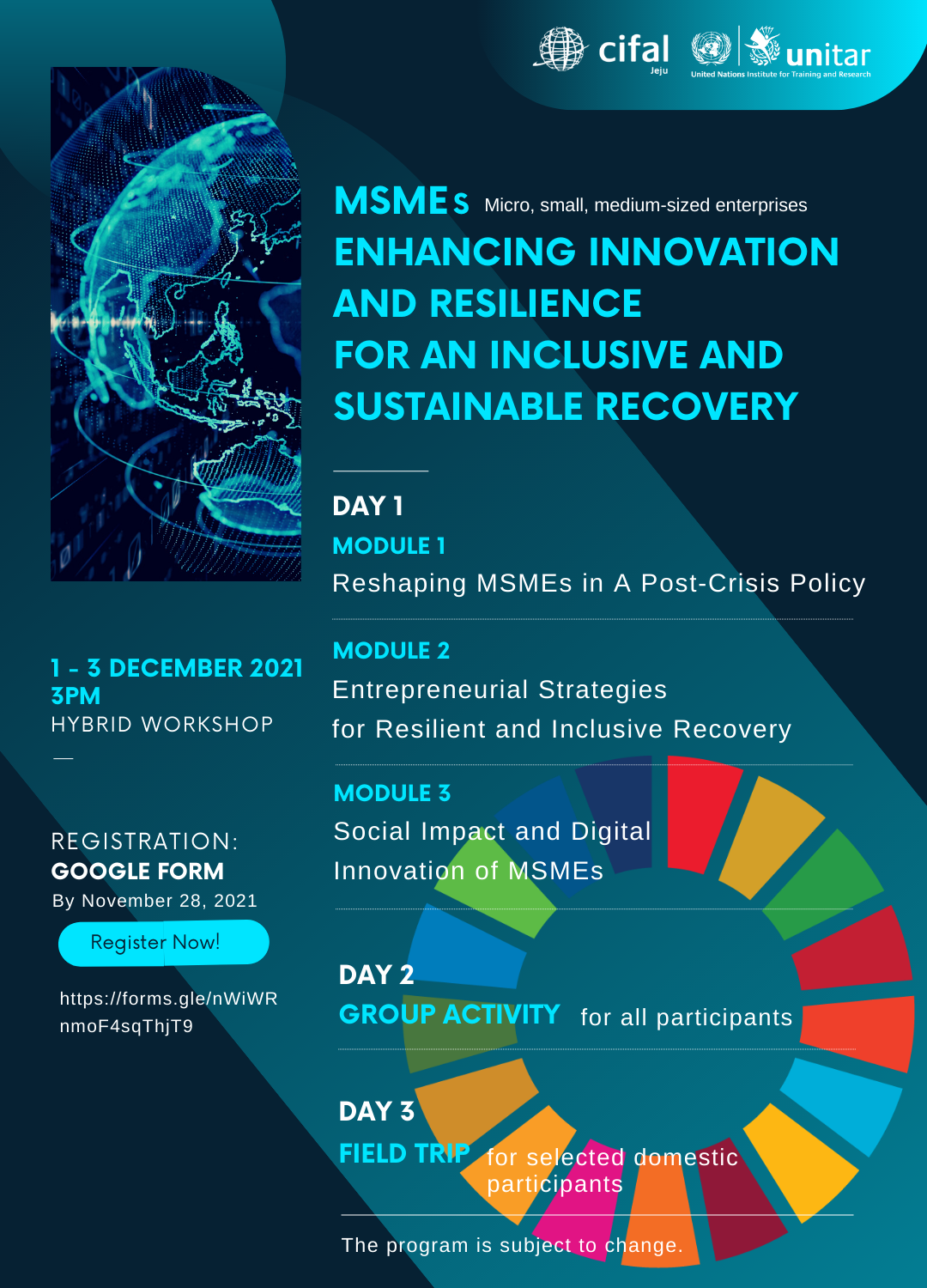Likewise, CIFAL Jeju/JITC has expanded its scope of workshops to include various aspects of economic development, such as sustainable urbanization, tourism, entrepreneurship, rural and agricultural development, smart city, green finance, and so on.

 2022.07.28
2022.07.28
|
MSMEs Enhancing Innovation and Resilience for an Inclusive and Sustainable Recovery
December 1 to 3 2021 15:00 (Korean Standard Time, GMT+8)
■ Background
Micro, small and medium-sized enterprises(MSMEs) comprise the backbone of the global economy, accounting for over 90% of all firms, on average 70% of total employment and 50% of GDP.1 Yet, they are disproportionately hit hard by the COVID-19 pandemic and the global recession. As a result, many MSMEs have seen significant falls in revenue while others often had to close operations. Governments, enterprises, and other social partners implement strategies to alleviate these negative impacts on business operations and protect workers’ rights in response to the health crisis. In this regard, the workshop explores how MSMEs can be equipped to ensure a resilient and sustainable recovery in the post-COVID-19 era.
The COVID-19 crisis and the related measures of confinement have severe consequences for micro and small business operations. The crisis leads to disrupting value chains, temporary closedown, falls in revenues, increases in unemployment2, and facing a cash shortage. According to the OECD and World Bank Future of Business Survey3, among SMEs that remained open from May to December 2020, between 55 to 70% saw sales decline, with two-thirds experiencing falls of more than 40%. The vulnerability of MSMEs is seen especially in lower-income economies where they are prone to using up liquid assets and cutting employment as a precaution.
It is also important for external support to enhance the effects of MSMEs’ innovation practices, the impacts on business performance and the likelihood of their survival from the repercussions of the COVID-19 pandemic. An OECD report4 illustrates that the scale of emergency packages-typically mixing subsidies, deferrals of payments, loans and loan guarantees, have helped SMEs and entrepreneurs remain afloat. In most OECD countries,
between 20%-40% of SMEs received government support in 2020. However, government support has been less effective at reaching the Micro, self-employed, younger firms, and women and minority entrepreneurs, thus widening pre-existing inequalities. Those shortterm support measures should be continued but it is crucial to invest in long-term structural policies such as digital innovation and financial inclusion, skills capacity development for sustainable and inclusive recovery.
Moreover, the pandemic may result in reshaping global supply chains and investments. As a result of lockdowns, many SMEs are affected by changes in international value chains such as production shortages and price volatility. Even those value chains make specialization more vulnerable. In this sense, building resilience requires diversification in sourcing and production locations, which yet is harder for smallest firms to adapt.
Regardless of challenges faced by MSMEs, digitalization, according to Asian Development Bank’s report5, holds the key to business performance of MSMEs. It is essential to create an environment to enable MSMEs to harness digitalization for productivity growth and for job creation. In fact, SMEs have been adapting their business models in particular through fast uptake of digital tools. The OECD report says 50% of SMEs increased digital up-take during the pandemic, helping accelerate the digital transition. Yet, there are widened gaps between large firms and the self-employed micro-firms in the digital transformation, and also between SMEs in digitally-intensive sector and those in the lowdigital sectors6. It is significant to adapt national and local policy on MSMEs and build policy frameworks to fully leverage the transformative potential of digital tools for all firms towards strengthening their resilience in the post pandemic recovery.
Thus, the purpose of the workshop is to share knowledge and good practices on enhancing the capacity of entrepreneurship and MSMEs, with a special focus on digital innovation to improve their resilience and competitiveness. Although the crisis has put strain on MSMEs and slowed down progress towards the Sustainable Development Goals, the collective endeavors will create longstanding impacts on MSMEs from surviving to thriving towards inclusive and sustainable business for the post-COVID19 recovery.
■ Event Objectives For the capacity building, this event will: • Offer a venue for knowledge sharing and to discuss regional status and issues of supporting the Micro, Small and Medium-sized enterprises. • Provide an opportunity for policy makers and experts to share and exchange their good practices.
■ Learning Objectives After this event, participants will be able to: • Raise awareness of the challenges and opportunities for the inclusive and sustainable recovery of MSMEs • have the understanding of business models to enhance digital innovation, and skills’ capacity development, and furthermore policies and strategies to support access to finance, market and human capital.
■ Target Audience This online event is open to government officials and personnel from civil and private sectors, non-profit sector including focal points for: • MSMEs entrepreneurship, Social Entrepreneurs, Start-ups, policies and strategies for Global Value Chains(GVCs), finance, employment, and digitalization This event is also open to representatives from the academia, research entities, development agencies and think tanks actively engaged in coordinating and implementing strategies in digital transformation and resilience of MSMEs.
■ Preliminary Program
■ Application and deadline Submit the application form https://forms.gle/nWiWRnmoF4sqThjT9 at 11:59PM by 28 November 2021 (Sunday).
*Applicants who want to attend the session offline and field trip, Submit the application form https://forms.gle/nWiWRnmoF4sqThjT9 at 11:59PM by 26 November 2021 (Friday). They need to meet the requirements below. • Currently stay in South Korea • Submit vaccination certificate to show that 14 days are passed after you are vaccinated and PCR test results in 48 hours before arriving in Jeju • Submit the Feedback form and share your workshop experience on SNS *Kindly note that only selected applicants will be notified individually.
UNITAR Cifal Jeju will provide an expenses for domestic airtickets, accomodations for 2 nights and a partial expense for meals.
■ Requirements Selected participants are required to: • submit assignments on time • actively engage in the training program • be fluent in written and spoken English |







